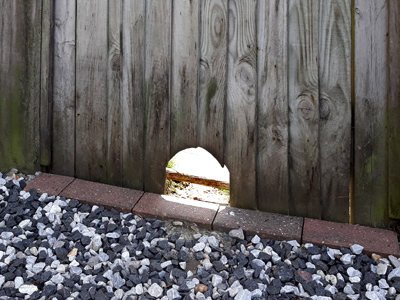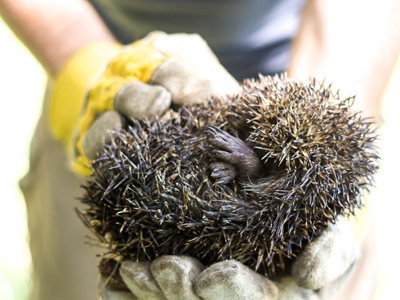Helping Hedgehogs
Hedgehogs are in trouble. Their natural habitats are being destroyed by modern farming methods, and roads cut across their ranges - 150,000 are killed by motor vehicles every year. Pesticides are also a problem, not only destroying their food source of invertebrates, but also poisoning the hedgehogs themselves.
Many hedgehogs seek refuge in towns, scavenging for food and hunting in our gardens. But even there hedgehogs are not safe. Paving slabs, walls, fences, ponds, gardening tools and, most of all, slug pellets, are all hazardous to hedgehogs.
What Can I Do To Help Hedgehogs?

Thankfully, hedgehogs have plenty of friends. People like you, who can take action to help – but how? You will be glad to hear that there’s a lot you can do for the humble hedgehog. We’ve put together this list of measures, some big, some small, which you can do for our prickly friends.
Tell Your Teachers
The Hedgehog Street website provides a range of resources that are designed to be used by teachers and other educators. Your teachers will probably be extremely pleased to hear about this website page and then your class, or even the entire school, will be able to participate in some really exciting activities.
Bring Down Barriers
Another great thing to do for hedgehogs is to let them into your garden. That doesn’t necessarily mean taking down your fences. Instead you can cut small holes in them at ground level. Make the holes about 12 cm tall and wide. That’s small enough to stop pets using them but large enough for hedgehogs to get through. If your neighbours follow suit, you can make your neighbourhood a haven for hedgehogs.
Plant Hedges
These are much better ways to ‘fence’ your garden than walls or fences. Not only do they allow hedgehogs and other wildlife to get into and out of your garden, they also provide hedgehogs with food, shelter and a place to hibernate.
Build A Compost Heap
Compost heaps naturally recycle garden waste and save you money on fertiliser, but they are also great for hedgehogs. That’s because they are a haven for invertebrates which hedgehogs feed upon. Put your heap somewhere that hedgehogs can easily access and don’t cover it up. But be careful – compost heaps make brilliant places for hedgehogs to hibernate. Make sure there are no sleeping ones in your heap before you turn it over with a garden fork!
Provide Food
A natural diet of invertebrates and berries is best for hedgehogs. Unfortunately, these are on the decline so it’s a good idea to give hedgehogs a helping hand – especially between November and March when prey is almost non-existent. True, hedgehogs hibernate through this period but, if they haven’t fattened up enough before they start to sleep, they may well wake up early.
Dog or cat food will be gratefully received but do not leave out bread and milk. They cannot digest milk and bread will fill them up without giving them enough energy. It’s also important to give them water, particularly during a period of dry weather or when puddles have turned to ice.
Give Hedgehogs Homes
Hedgehogs need safe places to hibernate and to bring up their young. One way you can help them is to build a hedgehog house (the Wildlife Trust has a great set of instructions for doing just that), or you could buy one for around £20.
If you would prefer a more natural home for hedgehogs then a woodpile will do the job or, failing that, just rest a piece of old wood against a fence to create an instant refuge. Even a pile of leaves and twigs will be made use of by a hedgehog. Leave it in a quiet corner of your garden and watch as it becomes occupied!
Let Part Of Your Garden Become Wild
Many gardeners insist on having a well-manicured lawn, but this is bad for wildlife. Instead, keep a patch of lawn unmown and sow some native plants and grasses. This will give hedgehogs somewhere to hide during daylight hours and give invertebrates a place to sleep during the winter.
Protect Hedgehogs From Ponds
Ponds are a great addition to a garden, and they encourage wildlife. But not all ponds are safe for hedgehogs. Hedgehogs can swim but, if the pond’s edges are too steep, they cannot get out and will drown after they become exhausted. If you do have a pond, make sure that its edges are shallow enough for hedgehogs to climb out of. If that is not possible, make your pond inaccessible by putting a barrier around it.
Have A Vegetable Patch
Growing vegetables in your garden is a great way to provide food for your family, but it will also help to feed hedgehogs. Why? Well, you probably know that vegetable plots attract slugs, snails, caterpillars and other “pests”, but these are food for hedgehogs. The great thing is you won’t need to fence off your vegetable patch, or to use pesticides to protect your crop. Any creatures trying to help themselves to your cabbages and lettuce will be picked off by our prickly protectors!
Be Cautious With Gardening Tools
During the day, hedgehogs hide themselves in undergrowth and overgrown grass. The trouble is that they hide so well we can’t see them. When we come to mow, strim or chop the vegetation, we might also chop up a hiding hedgehog. Before you start to cut any long grass, make sure you check for hedgehogs. If you find any, gently pick them up and put them in a safe and quiet place.
Do Not Use Chemicals In Your Garden
Slug pellets are the greatest danger to hedgehogs. Not only do they kill slugs and deprive hedgehogs of food, they also contain metaldehyde – a poison lethal to hedgehogs. Even something as apparently harmless as using weed-killer on your lawn hurts hedgehogs as it kills worms, another key food source.
How Can I Help Hedgehogs On The Roads?
We’re all familiar with the sight of dead hedgehogs on the road. It’s all too common because, when hedgehogs are faced with danger, they curl up into a ball hoping that their spines will protect them. Alas, they are no protection at all against cars and lorries.
So, what can we do about it? Sadly, very little. Some roads have hedgehog underpasses, but the vast majority do not. The best advice I can give you is to drive carefully and, if possible, slow down or even stop if you see a hedgehog crossing.
What Should I Do If I See A Sick Or Injured Hedgehog?

Hedgehogs are nocturnal animals and they hibernate for the winter. If you see one in daylight or during the coldest months then it might be in trouble, but not necessarily. If it looks thin, is staggering around or looks otherwise unwell, it may need your help if it is to survive.
First of all, grab yourself a largish cardboard box with deep sides (so the hedgehog can’t escape). Line your box with scrunched and torn newspaper, or maybe a towel, to give your hedgehog a place to snuggle and hide.
Next, find some gardening gloves – if you are going to pick a hedgehog up you need to protect your hands from those spines! Pick up the hedgehog gently and carefully put it in the box you have prepared.
Once the hedgehog is safely in your box, place the box somewhere warm and quiet and put a dish of water and another with cat or dog food in it. Now it’s time to find someone to help – the British Hedgehog Preservation Society can put you in touch with your local volunteers.
Tell People About Hedgehogs
The more people who know the perils faced by hedgehogs, the better. Perhaps the best way you can help our spiny friends is to spread the word. If you found this article interesting then share it with your friends. If we all make it our business to help the hedgehog, then perhaps we can turn around its declining numbers.
Another thing you can do is sign our petition calling for a ban on metaldehyde, the poison used in slug pellets. It was actually banned in 2018 but that decision was overturned by the High Court because of “how the decision-making process was conducted”.
Will you help us to save the hedgehog by signing? Simply follow this link and add your name.
If you love hedgehogs and want to find out more about them and our campaign, you might like to read these pages:



